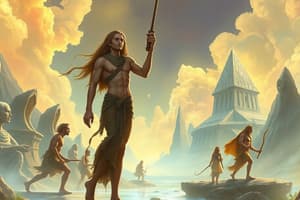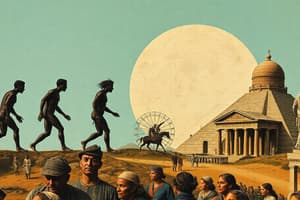Podcast
Questions and Answers
When did Homo sapiens, our species, emerge?
When did Homo sapiens, our species, emerge?
- 500,000 years ago
- 1 million years ago
- 300,000 years ago (correct)
- 700,000 years ago
Which early hominid genus began to walk upright, marking a significant step towards our current form?
Which early hominid genus began to walk upright, marking a significant step towards our current form?
- Homo habilis
- Australopithecus (correct)
- Homo erectus
- Neanderthals
Which period saw the first farmers and herders emerge?
Which period saw the first farmers and herders emerge?
- Neolithic period (around 10,000 BC) (correct)
- Paleolithic period
- Mesolithic period
- Bronze Age
Which region gave birth to the first true civilizations?
Which region gave birth to the first true civilizations?
What is the earliest known toolmaking species?
What is the earliest known toolmaking species?
Which species had larger brains and more advanced tools compared to its predecessors?
Which species had larger brains and more advanced tools compared to its predecessors?
What historical period saw the decline of the Roman Empire and the rise of feudalism?
What historical period saw the decline of the Roman Empire and the rise of feudalism?
Which historical period emphasized the value of reason and individualism?
Which historical period emphasized the value of reason and individualism?
What significant event occurred in 1492 during the Medieval Period?
What significant event occurred in 1492 during the Medieval Period?
Which era witnessed the growth of global trade, expansion of Christianity, and introduction of new goods?
Which era witnessed the growth of global trade, expansion of Christianity, and introduction of new goods?
Which event marked pivotal moments in the Age of Exploration and Revolution?
Which event marked pivotal moments in the Age of Exploration and Revolution?
Which historical period brought profound changes such as the growth of cities and the rise of the working class?
Which historical period brought profound changes such as the growth of cities and the rise of the working class?
Flashcards are hidden until you start studying
Study Notes
Exploring Human History: A Journey Through Time
Humans have an incredibly rich and diverse past, shaping the world as we know it today. Our history is a tapestry woven with countless stories, cultures, and events that continue to shape our collective identity. In this article, we'll explore various facets of human history, providing a snapshot of our evolution, innovation, and resilience.
The Earliest Days: The Origins of Humankind
Approximately 3.6 million years ago, the first hominids appeared on Earth. Australopithecus, a genus of early hominids, began to walk upright, which marked the first significant step towards our current form. Nearly two million years later, Homo habilis, the first toolmaking species, emerged. Homo erectus followed, with larger brains and more advanced tools, and eventually, Homo sapiens—our species—emerged around 300,000 years ago. These milestones shape our understanding of human evolution.
Early Civilizations
The Neolithic period, around 10,000 BC, saw the first farmers and herders emerge. Settling in one place allowed humans to develop complex societies. The Fertile Crescent, an area spanning from the Eastern Mediterranean to the Persian Gulf, gave birth to the first true civilizations. Sumerians, Babylonians, and Egyptians were among the earliest known civilizations, each leaving behind a wealth of knowledge and culture. Their contributions form the foundation of our modern societal and cultural structure.
Classical Antiquity: Greeks and Romans
The rise of the Greek city-state and the Roman Republic birthed the foundations of Western philosophy, science, and politics. While the Greeks influenced the world through their art, architecture, and scientific inquiries, the Romans further expanded their empire, integrating numerous cultures and extending their influence across Europe, North Africa, and the Middle East.
The Middle Ages: The Medieval Period
The Middle Ages, or Medieval Period, witnessed the decline of the Roman Empire and the emergence of feudalism. The period was marked by a renewed focus on religion, art, and literature, evidenced by the growth of monasticism and the spread of Christianity across Europe. The discovery of America by Christopher Columbus in 1492 is considered a significant event of this time. The Renaissance, a period of revival and rebirth, followed in the 14th and 15th centuries, leading us to the Age of Enlightenment.
The Age of Exploration and Revolution
Beginning in the 15th century, European explorers sailed across the globe, establishing trade routes and colonizing new lands. This period of exploration led to the growth of global trade, the spread of Christianity, and the introduction of new foodstuffs and goods. The Age of Enlightenment, which spanned the 17th and 18th centuries, emphasized the value of reason and individualism, leading to innovations in science, politics, and society. The American Revolution and French Revolution marked pivotal moments in this era.
The Modern Era
The Industrial Revolution, beginning in the late 18th century, brought profound changes to society, including the growth of cities, the expansion of industry, and the rise of the working class. The 20th century witnessed two devastating world wars, the development of nuclear weapons, and the emergence of the civil rights movement. Since World War II, humans have developed advanced technologies, explored space, and expanded our understanding of the world through science and culture.
Looking Ahead
From our earliest ancestors to the modern era, history has shaped the world we know today. By studying our past, we gain insights into the human condition, and by understanding our past, we can better prepare for our future. Whether through the lens of science, philosophy, or culture, the study of human history offers an unparalleled perspective on our world and our place within it.
Studying That Suits You
Use AI to generate personalized quizzes and flashcards to suit your learning preferences.




